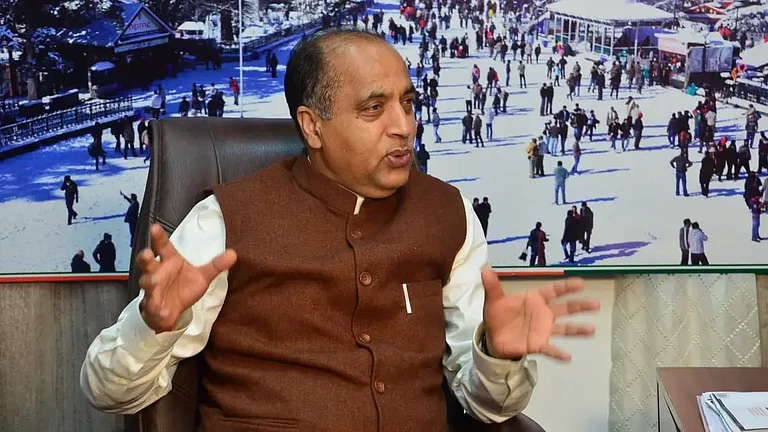Why does one come back? It is because from somewhere deep down erratically arranged layers of motley memories, one memory—timid and remote—chooses to escape and hound the migrant, not incessantly but erratically. It surfaces at odd hours when one is about to sleep or board the morning train. It's easy to come to terms with something routinised but not with something infrequent and unpredictable.
It is because the combination of longing for geography and people can be heady if one is distantiated in time and space. It could be banal images which no one notices otherwise; images such as a father sitting on a ramshackle chair and sipping black tea.
It is because what one misses are known flavours, arcane mysteries, disjointed coincidences and familiar yet frustrating cul-de-sacs. The world does not appear to be the same place in a new setting.
It is because torn between nostalgia and utopia the pining for a lived past is definitely greater than the promised, but deceptive intimations of a future utopia.
It is because galore are the trade-offs in life and more than anyone else, migrants are called upon to choose between impossibly difficult options—certainty of deprivation or insecurity of promise; between haunting thrum and bustle and the stillness of a dead place. The decision to return obviates the need to choose from impossibly intractable alternatives.
It is because the place of birth and formative upbringing provides a fair share of rights and wrongs; rights to be sustained and wrongs to be righted are always an unfinished business that must be finished.
It is because the idea of what one can laugh at non-stop is intimately connected with the idea of culture that becomes an integral part of the person.
It is because what haunts a migrant most is the fading memory; friends' faces becoming faint and enemies' faces assuming grotesque proportions, which is why the entire idea of love and hate assume strange nuances.
It is because every place has a different set of grammar, logic and rules. These are best learnt as a child and that child is ever present in the migrant adult forever in need of their cocoon of grammar, logic and rules.
It is because to paraphrase Albert Camus's "half-way between poverty and the sun", the hardship of an intimate setting could be more enriching than the optimism of an alien place.
One comes back because one never really or at least substantially goes away. To use a hackneyed cliche, home is where heart is; being at large on the roof on a moonless night is such a powerful reminder. It is because tea tastes so different; because friends give meaning and pertinence to a life in limbo in a topsy-turvy world; because father beckons, daughter conspires with the angels, wife propitiates gods and silence of the mother is so unnerving; because man and machine are still different; because scientific rationality is discredited and rightly so; because progress is not only about unilinear march ahead but also retreat; because the civilisation is not dead and people always find reason to smile.
Why do Biru and Jai come to Ramgarh?
It is because for all their muscularity, bravado and bombast, there is a big void in their lives. Of uncertain origin and at the margins of morality, they have made their mark in the urban landscape using the technology of violence. Over the years, the heartlessness of the city has taken inevitable toll; mundane violence has led to self-alienation and lost its mojo for them. Caught in the rut of a life on the run, they are in search of a new rationale of existence.
It is because after the fatigue of war-hardened lives is the renewed longing for normalcy where they could enter into an honourable pact with their age, life and society. Ramgarh is the final frontier beyond which lies prospects for a new life. They go to Ramgarh because they have to complete the process of journey. The one-way journey from the village to the slums has to end in a journey back to the village to restore it to its pristine self. In this process, Kaalias, Saambas and Gabbars would have to be exterminated.

They go to Ramgarh because they have an urge to surrender the trials and tribulations of a life half-lived to lovers who could be their catharsis as also their self-actualisation. Basanti and Radha offer the prodigals this possibility.
There is also an inner need to undo wrongs done to ancestors. Marquez so eloquently points out that one goes back because there is injustice, there is someone buried under, there are enemies and there is justice to be done.
Ramgarh is also the cockpit of Armageddon where the forces of evil have sought to upset the status quo of caste, class and political power upside down. Jai and Biru are the last bulwark against the forces of anomie represented by Gabbar. This anomie let loose upon the mythical village must be defeated by whichever means. For this, Jai and Biru must go back to Ramgarh.
It is also a moment of ultimate battle for them. So far, they had pitted their wits and wares against rather petty criminals but Gabbar is the ultimate test, and victory over him would give them a semblance of worth after their swan song, before they decide to settle into a life of pastoral bliss on the outskirts of Ramgarh.


























